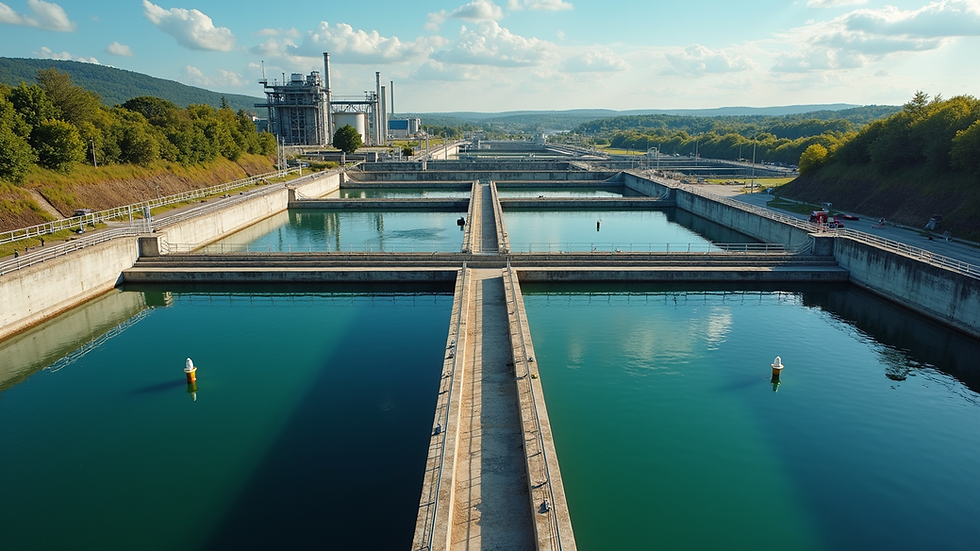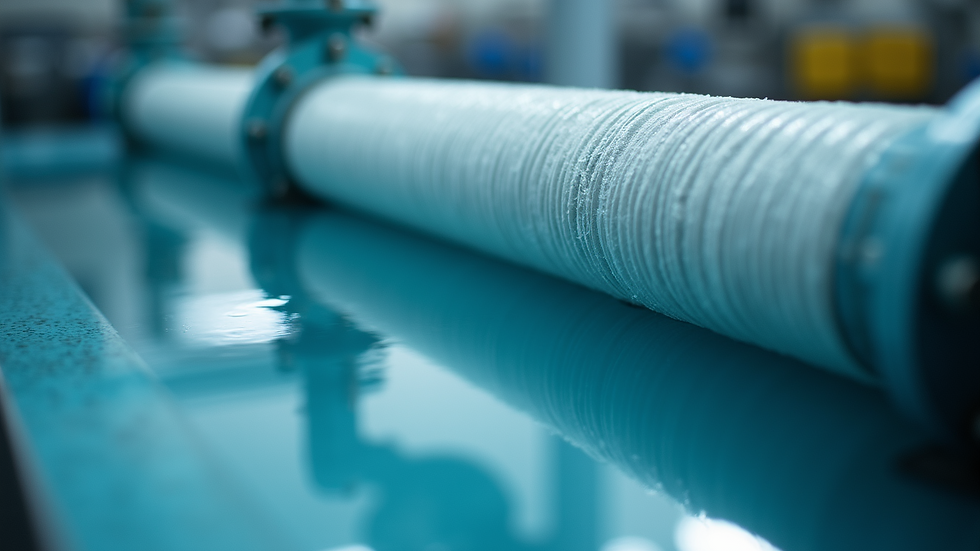Boost Sustainability with Industrial Wastewater Management
- karan9377
- Sep 1, 2025
- 4 min read
Industrial growth and urbanisation have brought significant challenges to environmental sustainability. One of the critical issues is managing the vast amounts of wastewater generated by industries. Proper treatment and management of this wastewater are essential to protect natural water bodies, conserve resources, and promote sustainable development. This article explores how effective wastewater treatment solutions can boost sustainability and offers practical insights into managing industrial wastewater responsibly.
The Importance of Wastewater Treatment Solutions in Industry
Industries such as manufacturing, textiles, chemicals, and food processing produce wastewater containing harmful pollutants. If untreated, this wastewater can contaminate rivers, lakes, and groundwater, posing severe risks to ecosystems and human health. Implementing robust wastewater treatment solutions helps:
Reduce environmental pollution by removing toxic substances.
Conserve water resources through recycling and reuse.
Comply with environmental regulations to avoid legal penalties.
Enhance corporate social responsibility and brand reputation.
For example, a textile factory can use advanced filtration and chemical treatment to remove dyes and heavy metals from its wastewater. This treated water can then be reused in cooling systems or irrigation, reducing freshwater consumption.

Key Wastewater Treatment Solutions for Sustainable Industry
There are several effective wastewater treatment solutions tailored to different industrial needs. Choosing the right technology depends on the type of pollutants, volume of wastewater, and local environmental standards. Common treatment methods include:
Physical Treatment
Screening to remove large solids
Sedimentation to settle suspended particles
Filtration to separate fine solids
Chemical Treatment
Coagulation and flocculation to aggregate contaminants
Neutralisation to balance pH levels
Oxidation to break down organic pollutants
Biological Treatment
Aerobic processes using bacteria to degrade organic matter
Anaerobic digestion for sludge reduction and biogas production
Advanced Treatment
Membrane filtration (e.g., reverse osmosis) for high purity water
Activated carbon adsorption to remove toxins and odours
UV disinfection to kill pathogens
Industries can combine these methods in a treatment train to achieve optimal results. For instance, a chemical plant might use physical screening, followed by chemical neutralisation and biological treatment to ensure safe discharge.

What is the industrial wastewater treatment?
Industrial wastewater treatment refers to the processes used to remove contaminants from water discharged by industrial activities. This treatment is crucial because industrial wastewater often contains hazardous chemicals, heavy metals, oils, and organic pollutants that can harm the environment if released untreated.
The treatment process typically involves several stages:
Preliminary treatment to remove large debris and grit.
Primary treatment to settle suspended solids.
Secondary treatment using biological methods to degrade organic pollutants.
Tertiary treatment for advanced purification, including nutrient removal and disinfection.
Each stage is designed to progressively reduce pollutant levels, making the water safe for discharge or reuse. For example, in the food processing industry, wastewater rich in organic matter undergoes biological treatment to convert waste into harmless byproducts.
Effective industrial wastewater treatment not only protects water bodies but also enables industries to recover valuable resources such as water, energy, and nutrients, contributing to a circular economy.
Practical Steps to Implement Industrial Wastewater Management
Implementing effective industrial wastewater management requires a strategic approach. Here are actionable recommendations for industries aiming to boost sustainability:
Conduct a wastewater audit to identify pollutant types and volumes.
Invest in customised treatment systems that match specific wastewater characteristics.
Train staff on best practices for wastewater handling and treatment.
Monitor effluent quality regularly to ensure compliance with standards.
Explore water reuse opportunities within the facility to reduce freshwater demand.
Engage with technology providers for innovative and cost-effective solutions.
For example, a manufacturing plant can install sensors to continuously monitor wastewater parameters like pH, turbidity, and chemical oxygen demand (COD). This data helps optimise treatment processes and prevent environmental violations.

The Role of Technology and Innovation in Sustainable Wastewater Treatment
Advancements in technology are transforming wastewater treatment, making it more efficient and sustainable. Innovations include:
Smart sensors and IoT for real-time monitoring and automated control.
AI and machine learning to predict treatment outcomes and optimise operations.
Energy-efficient treatment units that reduce power consumption.
Resource recovery technologies that extract biogas, nutrients, and clean water.
For instance, some industries now use anaerobic digesters that convert organic waste into biogas, which can power the facility, reducing reliance on fossil fuels. Additionally, membrane bioreactors combine biological treatment with membrane filtration, offering compact and highly effective solutions.
By adopting these technologies, industries can lower operational costs, reduce environmental impact, and contribute to global sustainability goals.
Moving Towards a Sustainable Future with Responsible Wastewater Practices
Sustainability in industry is no longer optional but a necessity. Proper wastewater treatment and management play a pivotal role in this transition. By investing in effective wastewater treatment solutions, industries can:
Protect ecosystems and public health.
Reduce water scarcity through reuse and recycling.
Comply with environmental laws and avoid penalties.
Enhance their reputation as responsible corporate citizens.
Every step taken towards better wastewater management contributes to a cleaner, healthier planet. Industries that prioritise these practices will not only meet regulatory demands but also gain competitive advantages in an increasingly eco-conscious market.
Embracing sustainable wastewater treatment is a win-win for businesses and the environment alike. It is time to act decisively and integrate these solutions into industrial operations for a resilient and sustainable future.



Comments